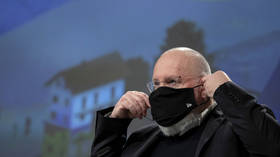‘Mistakes’ were made during EU’s Covid-19 vaccination program, Commission VP admits

The EU vaccination program has been riddled with “mistakes,” European Commission VP Frans Timmermans has admitted. The vaccination drive has been plagued by supply shortfalls, plus repeated allegations of uneven distribution.
The admission was made by Timmermans in an interview with German daily Der Tagesspiegel, published on Sunday.
It is true that mistakes were made when ordering vaccines, both by Brussels and by the member states.
It is too early to draw any conclusions, though, and currently the priority is to ensure that “all of Europe gets vaccines,” the official stressed.
“I am ready to take stock at the end of the pandemic. Then we can see what we did wrong and what we did right,” Timmermans added.
Admitting that the EU’s approach to the Covid-19 vaccination most benefited “the richer states” like Germany, Timmermans still said the joint EU-level order of the vaccines was a right thing to do.
Also on rt.com EU's von der Leyen threatens further Covid vaccine export controls, says AstraZeneca supplied less than 10% of agreed jabsTimmermans’ admission comes as the EU vaccination drive, which has already been lagging behind schedule, ran into fresh problems. On Friday, one of the bloc’s primary suppliers, British-Swedish pharmaceutical giant AstraZeneca, warned that deliveries of the vaccines are expected to be delayed further. The pharmaceutical giant blamed the disruption on production issues, as well as export restrictions.
“Unfortunately, export restrictions will reduce deliveries in the first quarter, and are likely to affect deliveries in the second quarter,” AstraZeneca said in a statement.
The company has already experienced difficulties in fulfilling its commitments to the EU, slashing the initially agreed amount of 80 million doses in the first quarter by more than half. The speed of deliveries has been very slow, with European Commission President Ursula von der Leyen revealing this week that the pharma company had delivered less than 10% of the agreed number of vaccine doses.
The distribution of the scarce vaccine supply among the EU member states has also been repeatedly criticized. The claims of “unfair” distribution were bolstered on Friday by Austrian Chancellor Sebastian Kurz, who alleged that some under-the-table deals between certain EU members and pharma companies might have taken place.
“There are indications that a so-called bazaar took place there, where extra agreements between member states and pharma companies were reached,” Kurz said.
Despite promises from Brussels to distribute the vaccines proportionally, the “deliveries are not happening in line with population,” he added. The chancellor’s claims have been challenged by Austria’s own health ministry, with its general secretary, Ines Stilling, insisting that the distribution process followed “very balanced and transparent negotiations.”
Also on rt.com Austrian chancellor suspects ‘secret contracts’ signed at ‘vaccine bazaar’ behind unequal jab distribution in EUThe high-profile allegations were followed by a letter penned by the leaders of Austria, Bulgaria, the Czech Republic, Latvia, and Slovenia, calling for an emergency EU summit to address the issues. If the distribution inequality persists, it might jeopardize the bloc’s efforts to mount a unified response to the pandemic, the letter published on Saturday warned.
“If this system were to carry on, it would continue creating and exacerbating huge disparities among member states by this summer, whereby some would be able to reach herd immunity in a few weeks while others would lag far behind,” the letter reads.
Think your friends would be interested? Share this story!












